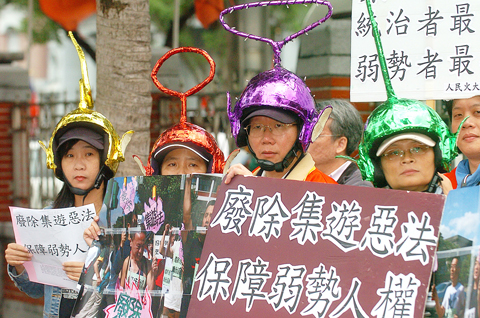Saying that the Assembly and Parade Law (集會遊行法) restricts people more than it protects them, several civic groups demonstrated outside the Legislative Yuan yesterday, demanding that the law be abolished.
“Assembly and parade are ways through which we the people express our voice,” said Wang Ping (王蘋), secretary-general of the Gender/Sexuality Rights Association Taiwan.
“The law, designed to protect our right to hold demonstrations, only tells us that we can’t do this or we can’t do that — how is that a protection?” she asked.

PHOTO: WANG MIN-WEI, TAIPEI TIMES
A demonstration organizer must submit an application for an assembly and parade permit to the local police authority six working days before a demonstration. The organizer must file a separate application for the right to use public spaces in advance and pay a NT$30,000 (US$900) deposit.
However, even if everything is filed in time and conforms to the law, it does not mean that permission would be granted.
The annual gay pride parade in Taipei — held on Sept. 27 — was forced to change its route this year because “no rally or parade can be held in the Boai District [博愛特區] as the national day celebrations were in preparation,” Wang said.
The Boai District is where many central government offices, such as the Presidential Office, are located.
The National Teachers’ Association’s (NTA) application to hold a demonstration in front of the Ministry of Education on Sept. 28 was turned down for the same reason.
“Be they politicians in the green camp or the blue camp, this law is their favorite tool,” NTA spokesman Lo Te-shui (羅德水) said. “The more political a rally is, the easier the permission would be granted. It’s always very difficult for other grassroots campaigners to obtain rally permission.”
“Before he was elected to the presidency, President Ma Ying-jeou [馬英九] and the Chinese Nationalist Party [KMT] voiced their support for amending the law, but now that they’re in control of both the government and the legislature, what has happened to the promise?” Lo asked.
While some of the protesters, such as Green Party Taiwan secretary-general Pan Han-shen (潘翰聲), said they could accept a revised version of the law if the new version actually offers protection of rather than restrictions on the right to assemble and protest, most others insisted that the law should be abolished.
“I don’t want the law to be amended, because however it’s revised, it will still be [the government’s] law — I want it to be abolished,” said Fred Chiu (丘延亮), an associate research fellow at Academia Sinica’s Institute of Ethnology.

An essay competition jointly organized by a local writing society and a publisher affiliated with the Chinese Communist Party (CCP) might have contravened the Act Governing Relations Between the People of the Taiwan Area and the Mainland Area (臺灣地區與大陸地區人民關係條例), the Mainland Affairs Council (MAC) said on Thursday. “In this case, the partner organization is clearly an agency under the CCP’s Fujian Provincial Committee,” MAC Deputy Minister and spokesperson Liang Wen-chieh (梁文傑) said at a news briefing in Taipei. “It also involves bringing Taiwanese students to China with all-expenses-paid arrangements to attend award ceremonies and camps,” Liang said. Those two “characteristics” are typically sufficient

A magnitude 5.9 earthquake that struck about 33km off the coast of Hualien City was the "main shock" in a series of quakes in the area, with aftershocks expected over the next three days, the Central Weather Administration (CWA) said yesterday. Prior to the magnitude 5.9 quake shaking most of Taiwan at 6:53pm yesterday, six other earthquakes stronger than a magnitude of 4, starting with a magnitude 5.5 quake at 6:09pm, occurred in the area. CWA Seismological Center Director Wu Chien-fu (吳健富) confirmed that the quakes were all part of the same series and that the magnitude 5.5 temblor was

The Central Weather Administration has issued a heat alert for southeastern Taiwan, warning of temperatures as high as 36°C today, while alerting some coastal areas of strong winds later in the day. Kaohsiung’s Neimen District (內門) and Pingtung County’s Neipu Township (內埔) are under an orange heat alert, which warns of temperatures as high as 36°C for three consecutive days, the CWA said, citing southwest winds. The heat would also extend to Tainan’s Nansi (楠西) and Yujing (玉井) districts, as well as Pingtung’s Gaoshu (高樹), Yanpu (鹽埔) and Majia (瑪家) townships, it said, forecasting highs of up to 36°C in those areas

The brilliant blue waters, thick foliage and bucolic atmosphere on this seemingly idyllic archipelago deep in the Pacific Ocean belie the key role it now plays in a titanic geopolitical struggle. Palau is again on the front line as China, and the US and its allies prepare their forces in an intensifying contest for control over the Asia-Pacific region. The democratic nation of just 17,000 people hosts US-controlled airstrips and soon-to-be-completed radar installations that the US military describes as “critical” to monitoring vast swathes of water and airspace. It is also a key piece of the second island chain, a string of